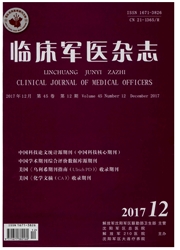

 中文摘要:
中文摘要:
目的探讨影响子宫颈癌根治术后患者发生肺转移的高危因素。方法分析2006年1月至2011年12月在解放军第一〇五医院治疗的32例子宫颈癌根治术后肺转移患者的临床资料,分别比较不同病理特征对患者术后肺转移的影响。结果单因素分析显示:早期宫颈癌术后肺转移的发生与临床分期、肿瘤直径、病理类型、浸润深度、术前相关血清肿瘤标志物鳞状上皮癌抗原(SCC)异常有关(P〈0.05)。多因素分析显示:肿瘤直径、病理类型、术前血清SCC水平是影响术后肺转移的独立危险因素(P〈0.05)。结论肿瘤直径、病理类型、术前血清SCC水平是预测子宫颈癌术后肺转移的重要参考因素。
 英文摘要:
英文摘要:
Objective To explore the risk factors for lung metastasis of early-stage cervical cancer after radical hysterectomy. Methods A retrospective study was performed on 32 cases of patients with lung metastasis of cervical cancer after radical surgery from January 2006 to December 2011. To compare the effect of different pathological characteristics on the postoperative pulmonary me-tastasis. Results Univariate analysis showed that the clinical stage,tumor size,histologic types,depth of invasion and abnormal tumor markers were significantly correlated with postoperative lung metastasis(P〈0. 05). Multivariate analysis showed that only tumor size, histologic types and abnormal tumor markers were independent risk factors for lung metastasis of cervical cancer(P〈0. 05). Conclusion Tumor size,histologic types and preoperative serum SCC level are important factors in predicting the lung metastasis of cervical cancer after operation.
 同期刊论文项目
同期刊论文项目
 同项目期刊论文
同项目期刊论文
 期刊信息
期刊信息
